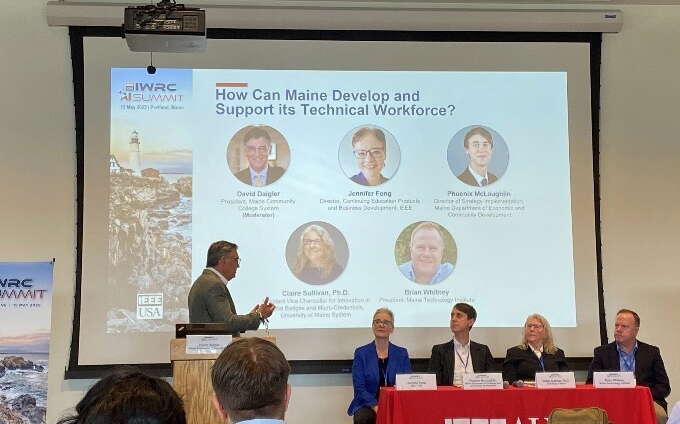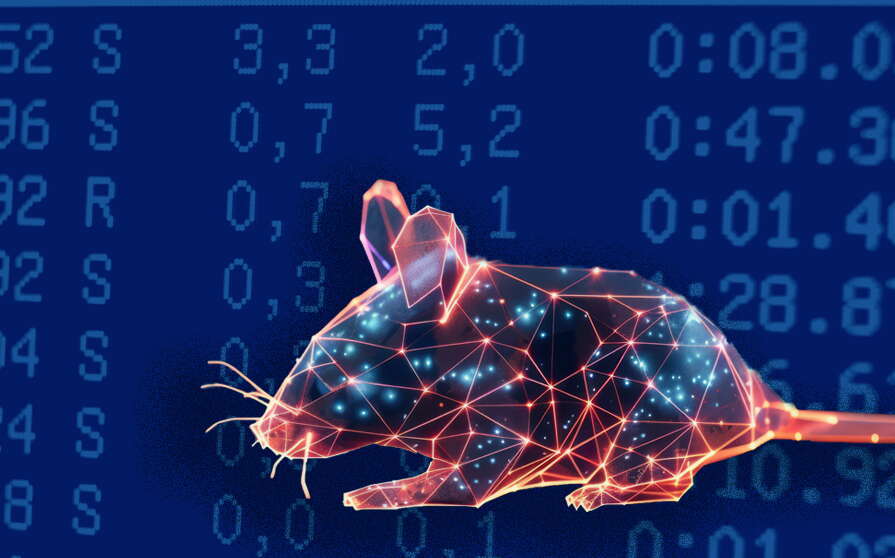
Maine task force maps AI strategies, caveats for economy, workforce
 Photo / Courtesy Governor’s Office of Policy Innovation and the Future
AI Task Force co-chairs David Daigler and Mary Dickinson, with Gov. Janet Mills.
Photo / Courtesy Governor’s Office of Policy Innovation and the Future
AI Task Force co-chairs David Daigler and Mary Dickinson, with Gov. Janet Mills.
MaineHealth Maine Medical Center has begun introducing artificial intelligence tools into its operations.
Researchers at Bath Iron Works have developed a first-of-its-kind AI tool for early identification of maintenance needs on Navy vessels.
J.D. Irving’s Ashland sawmill is using AI for timber identification, optimizing efficiency in lumber production.
These are just a few applications identified by a state task force on the use of artificial intelligence in Maine.
And there’s opportunity for more.
Artificial intelligence has the potential to help Maine businesses of all sizes and increase productivity, competitiveness and innovation and expand opportunities for good jobs, according to the report.
"AI already has an outsized impact on our professional and personal lives, and its rapid growth, power and potential make it clear why the work of the Maine AI Task Force is critical right now," said David Daigler, the task force’s co-chair and president of the Maine Community College System. "AI can do great things, but there are also risks that must be addressed.”
Widespread integration
The 21-member task force was established by Gov. Janet Mills in December 2024. The group’s report, released last week, delivered 33 recommendations designed to lay a foundation for bolstering innovation related to AI while strengthening guardrails against its potential harms.

Artificial intelligence refers to computer systems that perform tasks through pattern recognition, predictive modeling, language processing and content generation. Over recent years, the use of AI has rapidly expanded with emergence of new tools and its widespread integration into the economy.
Nearly one-fifth of U.S. workers are classified as highly exposed to AI, making them vulnerable to job transformations driven by advancements in the emerging technology, according to the governor's office.
At the same time, AI has the potential to create new jobs and businesses, improve productivity and efficiency, and reduce barriers to entry into some technical fields.
The task force brought together business, education, labor, government and community leaders to study the challenges and opportunities associated with AI.

“As we think about employer perspectives and employer engagement, it’s equally important to think about perspectives of workers and how we’re connecting with folks who are seeing these changes as they roll out,” said Sam Boss, Maine AFL-CIO’s apprenticeship, workforce and equity director. “Oftentimes they’re the ones that have the best sense what this actually looks like on the ground.”
AI adoption
The report found that applications of AI tools include:
- Bangor Savings Bank launched an initiative to equip all employees with AI education and literacy.
- MaineHealth’s HE(ART) initiative is using AI for real-time monitoring in intensive care units and AI-based charting tools are enabling providers to focus more time with patients.
- New England Marine Monitoring applies AI-driven image recognition to improve fish stock assessments.
- The University of Maine uses AI for forest mapping and pest management.
- Jackson Lab in Bar Harbor recently rolled out a line of AI-enabled consumer products.
- IDEXX Laboratories is deploying AI-powered veterinary diagnostics.
- A partnership between the Gulf of Maine Research Institute and the Roux Institute developed an AI “marine vision system” that combines night vision, computer vision AI and augmented reality navigation that plugs into standard helm displays as a way to address causes of marine accidents such as operator inattention and poor visibility.
Opportunities, risks
Goals are to:
- Launch a public AI literacy campaign to help Mainers navigate the emerging technology in their daily lives, including older adults and youth.
- Use AI opportunities to increase productivity, create new industries and support entrepreneurs, while acknowledging the potential for job disruption in fields ranging from manufacturing to professional services.
- Support innovation, training and dialogue at the local level in the education and health care systems.
The group emphasized the importance of responding to risks AI poses, including privacy of personal data, cybersecurity and deepfakes such as manipulated voices, images and personas. It recommended exploring protections for consumers, children and creative industries without preventing Maine people from accessing opportunities with potentially substantial benefits.
State agencies and local governments can use AI to better serve residents, said the group, which recommended that the state enhance planning and transparency around the use of AI tools at state agencies and develop a structured approach to responding to AI-related development projects, such as data centers.
“AI can help cities like Auburn address capacity gaps, streamline permitting and licensing, improve customer service and modernize outdated systems — even when resources are limited,” said Jay Brenchick, task force member and director of economic development for the city of Auburn. “But innovation must be balanced with protection. As we adopt these tools, we also have a responsibility to safeguard resident data, ensure transparency and promote AI literacy.”
Sara Gagné-Holmes, commissioner of the state Department of Health and Human Services, said AI has the potential to expand access to care, particularly in rural Maine, and to support providers in delivering high-quality services.
“As we explore these tools, we must also protect privacy and ensure that care remains human-centered,” she said.














0 Comments